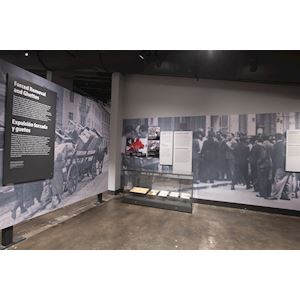
104 - Bearing Witness - Forced Removal and Ghettos
NARRATOR As the Nazis expanded their reach across Europe—following the invasion of Poland in 1939—they also intensified their program of persecution. Their strategy shifted from intimidating Jews to removing them from their homes by force and relocating them into restricted areas known as ghettos. At this point, the doors of emigration were closing … and for most people, had already closed. Miriam Brysk: "…The ghetto slowly got filled up with people from nearby vicinities, as people from other towns were being brought so that they could make entire territories Judenfrei—free of Jews." NARRATOR Maybe—as you move into this part of the exhibit and step on the bridge—you may feel confined… even excluded from the world beyond the bridge. Bridges and walls were used to segregate the Jews. What followed for the Jews was much much worse. Survivor Celina Fein describes the Warsaw ghetto—the largest of the ghettos: "…the general situation in Warsaw was just absolutely beyond description. People were laying on the street dying. Little children were begging on the street. 'Please give me a piece of bread, I am dying of hunger'…the dead bodies became a common sight on the streets of the ghetto…and, of course, many people died of typhus." (p20) NARRATOR The Warsaw Ghetto occupied 1.3 square miles. More than 400,000 people lived there. Overcrowded and miserable, hopeless and helpless residents struggled to keep their bodies, minds, and spirits alive. Many Jews in the ghettos sought ways of practicing their faith and staying hopeful—as an act of defiance as much as comfort. However, the ghetto was not the ultimate destination for Europe’s Jews. When the deportations began, the population of the ghettos decreased rapidly as the residents were moved to concentration camps and killing centers.


Holocaust Museum Houston
Holocaust Museum Houston is dedicated to educating people about the Holocaust, remembering the 6 million Jews and other innocent victims and honoring the survivors’ legacy. Using the lessons of the Holocaust and other genocides, we teach the dangers of hatred, prejudice, and apathy.
- 5401 Caroline
- Houston United States
- 713-942-8000
- www.hmh.org
